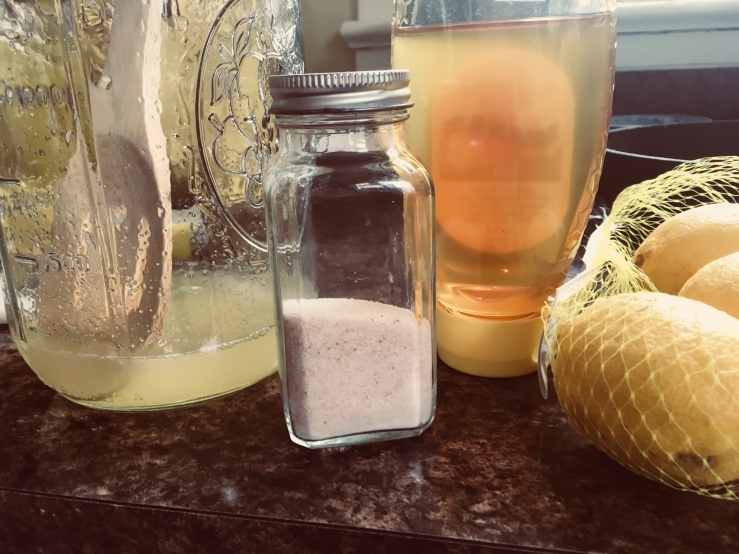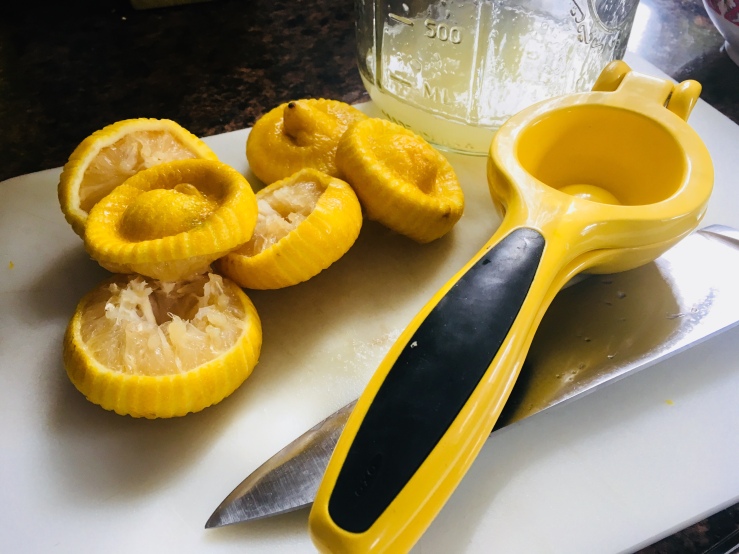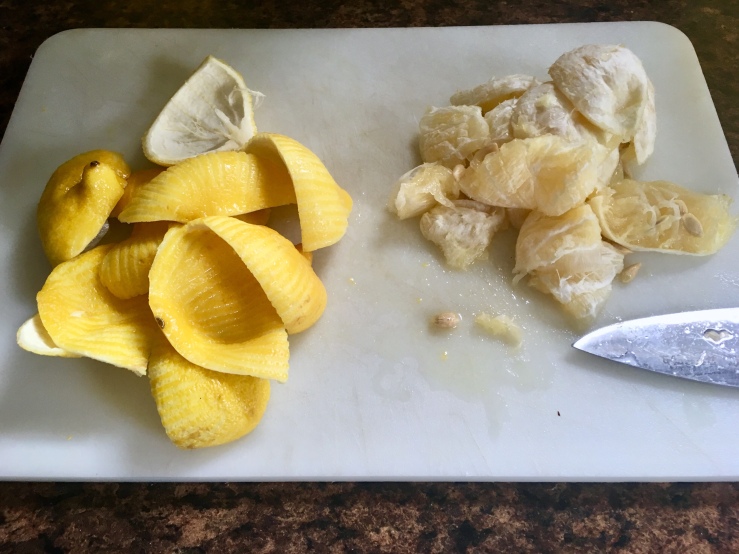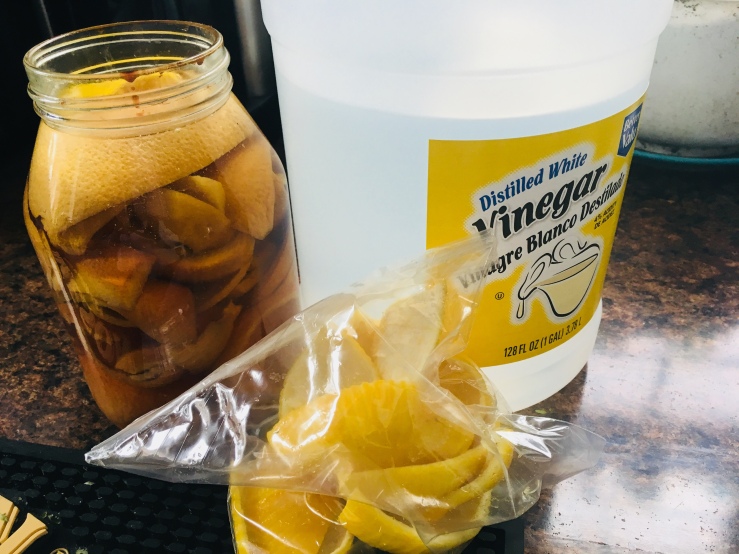There are so many things you can do with lemons! (Other than simply chucking them at whoever brought the proverbial lemons into your life…)
I love lemons. They’re bright and cheery, they’re tart and tangy, and they are oh, so versatile! Food, drink, cleaning, deodorizing, whitening, lightening, refreshing, thickening…what can’t you do with lemons?
So I started with three lemons. (Organic, yes, because wax, no matter how “food grade” it is, is not something I like to on my produce, thank-you-very-much food industry weirdos.) Here is what I did with my lemons….not a drop wasted.
The tools:

Not entirely necessary, but makes life, and lemons, easier:
- sharp knife (well, that is probably necessary)
- cutting board (highly recommended, unless you don’t really like your counters)
- zester (that’s the black-handled tool pictured above)
- citrus juicer (this is mine. there are others, but this one is mine)
Zest:

That pile of curly, yellow wonderfulness on the right…that’s lemon zest. Yes, the zester does make things easier, but I have, in the past, simply cut a thin layer of the rind off the lemon, making sure not to cut into the white, and then thinly slicing.
The zest of a citrus fruit holds a lot of the oil from the fruit. As you zest, or peel, or simply squeeze the skin, you can feel the oil on your hands. So lemon essential oil? Yeah, same thing. Just not all neatly bottled (and refined and overpriced) for you.
The zest, as it is a thin layer of the rind, is full of pectin, which is a natural thickener for sauces or pie filling or yogurt, or whatever needs some thickening. Most fruits have it, citrus fruits have a lot of it.
The zest, being full of that wonderful lemon oil, is also very lemony. It makes a great garnish that adds both flavor and visual appeal, or can be cooked into a dish to add a lemony kick without the added liquid of juice.
If I use lemons (the ones without the wax) for anything, I try to remember to zest them first, even if I have no use for it at that moment. It can be frozen in baggies for later use, or dried/dehydrated and stored in a cool, dark place.
With this pile of zest (from 3 lemons) I added about 1/3 to some apples and sugar and spices in my apple pie, and the rest went in a pot with cranberries, water, and sugar to thicken up my cranberry drizzle (kind of like a sauce, kind of like a thin jam…) to go over the a la mode pie.
There is so much yum here!
Electro-lit Lemonade (aka Electric lemonade, aka just lemonade)
The juicer comes in handy here. Like I said, not necessary…you can simply squeeze the old fashioned way, but I do juice a lot of citrus, and for $8, this citrus juicer seemed like a good investment. They do sell smaller green ones and larger orange ones, presumably to match the citrus fruit to the color of the tool…but I find most oranges I buy fit in this one just fine, and I don’t think it cares that I’m squeezing lime juice out of it.
This lemonade is a fantastic substitute for sports drinks in my house. There are natural electrolytes in it, and it seems to have the same effect post exercise, when hungover or dehydrated, or for a slight energy boost on a hot day, that the sugar-ade has when we drink it. Plus, I get to control the sugar content and what type of sugar I put in.
Basic Recipe:
- In a half gallon jug or jar, squeeze the juice of 3 fresh lemons.*
- Add your sweetener of choice, to taste. **
- Add 1/8 teaspoon of salt.
- Stir until salt and sweetener are dissolved.
- Fill jug/jar with water. voila!
* 3 lemons is a guideline, and produces a half-gallon of semi-tart lemonade. Also, oranges or limes can be used with, or instead of any of the 3 lemons. Probably even grapefruit. I mix and match, or sometimes all of one juice. It’s all up to your taste and mood and what you have on hand.
** I use honey most of the time. My general guideline is to cover the bottom of whatever container it is with about a half-inch of honey (the lemon juice will dissolve the honey as you stir it, before adding cold water/ice). But sugar works just as well, and again, this is all to taste.

As long as you have citrus juice, sugar of some kind, and some salt, you have a delicious electrolyte drink that’s cheaper, healthier, and more customizable than any of the brightly colored sugar bombs at the store.
All-purpose, grease-cutting cleaner:
So you’ve squeezed all the juice out of the lemons and are left with these seemingly useless husks:

But wait, there’s still more you can do!
Remember what I said about the lemon rind and the oils in it? Well there’s still a good amount of oil left in those rinds, even after zesting and squeezing, which can be infused into a very effective, sanitizing, grease cutting, all-purpose cleaner.
- First remove all the fruit flesh from the peel. I find it easiest to cut the rounds in half, and pull them away from one corner

- Stuff the rinds, plus whatever other lemon, orange, or grapefruit*** rinds you have around into a jar.
- Fill it to the top with white distilled vinegar, jostling it a bit to shake all the trapped air bubbles loose.

Consequently, I already have a jar going, so I put my rinds in a ziplock baggie bound for the freezer
- Lid tightly and store in a dark place (like your pantry or under the sink) for at least 4 weeks. If you have metal lids, put a piece of parchment or wax paper under the lid to keep the vinegar from eroding the metal.
- Shake it from time to time, and after 4 weeks, strain into a spray bottle for use.
We keep all our rinds in the freezer for when I need a refill. I simply pull the frozen ones out, stuff them in the jar, and cover with vinegar. I haven’t noticed the freezing affecting anything, and since it’s the oils we’re after, that makes sense to me.
***As a note, I’ve seen this citrus cleaner in a lot of places, but I’ve never seen limes mentioned. I’m not sure why, or if lime oil works the same…if anyone has insight to this, I’d definitely be interested!
So now we’ve made zest (pie and cranberry stuff), lemonade with an electrolyte kick, all-purpose cleaner…

But we still have the juiced interior fruit parts.

And I said nothing wasted…so, what can you do with those?
- throw them down your disposal and run it to deodorize
- rub them on dark spots on your skin for a brightener
- rub them on your teeth for a whitener
- rub them on your cutting boards for a cleaner/refresher
- add them to water/sparkling water for a light lemony infusion
- squeeze them in the cuts and eyes of your enemies
- compost them (break down much quicker than the rinds)
So there we have it. Three lemons, no waste. Hooray! What do you do when life gives you lemons?





[…] The strained milk solids can probably be used for something…they have a kind of toasty, nutty flavor. (Let me know in the comments if you come up with something…I hate to waste anything!) […]
LikeLike
Wow!
I use lemon juice to activate baking soda in cakes, instead of using baking powder (which brand do you use?), otherwise I freeze the juice in ice cube trays for future use. I also freeze the empty lemon shells, because I find it easier to grate the zest off them when they are frozen. I will definitely start using the interior fruit part with vinegar as a multi-purpose natural cleaner (right now I can’t think of anyone I should squirt them at 😄) .
Thank you for all the tips!
By the way, do you make your own laundry detergent?
LikeLike
I use bobs red mill baking powder usually, but any baking powder without the aluminum part has worked out ok for me. I does tend to cake in the package though. I didn’t know you could use lemon juice like that with baking powder.
I have tried making my own laundry detergent. I plan to do a post on those adventures, and it did work great, but I have it up for times sake. I will post my recipe soon though.
LikeLiked by 1 person
My daughter (who lives in New England — we live in France) gets Trader Joe’s baking powder, also aluminium free, but it has cornstarch. Bob’s Red Mill products are pretty safe as far as sulfites are concerned. They have told me that only their potato starch contains some sulfites (at a low level). Not knowing what brand potato starch to buy in the U.S., for now I am condemned to carrying bags of “fécule de pomme de terre sans gluten” manufactured in France in my checked luggage every time we visit!
LikeLike
Me again! Do I have your permission to reblog this?
LikeLike
Absolutely!
LikeLiked by 1 person
[…] When life give you lemons, use them! — Read on nomapi.com/2018/11/13/270/ […]
LikeLike